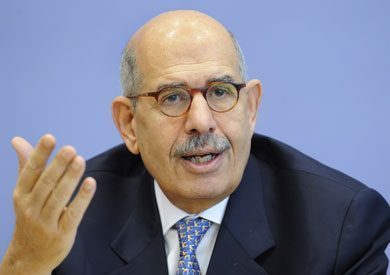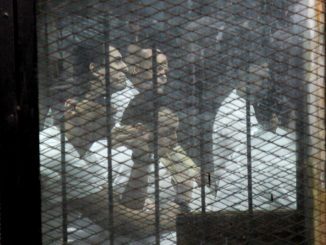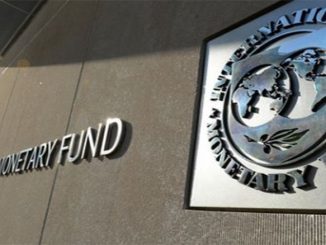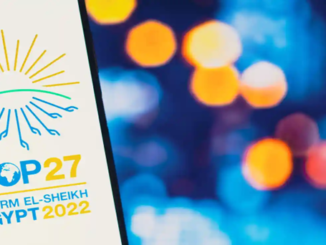
Mohamed ElBaradei -Egypt’s former Vice-President for Foreign Affairs- has stated that he was accused of being “a dangerous man to the people and the state” on August 6, 2013, by one of the well-known writers in a state-owned newspaper, reported al-Shorouk, an independent newspaper.
ElBaradei added on his official page on Facebook, “In the evening of the same day, I was subjected to fierce attack by some guests on TV channels. Then, this was followed by a letter from a sovereign agency (often referring to an intelligence service) on the next day telling me that this was just a warning and they will destroy me if I continue in my attempts to reach a peaceful resolution to disperse the sit-ins or a formula for national reconciliation.”
He continued, “On August 14 and after the use of force in dispersing the sit-ins, there was a hysterical campaign by the “national” forces and even those who call themselves “the elite” and some of the “revolution youth” welcoming strongly the use of violence. They attacked me harshly for my immediate resignation once I was informed of the use of force, refusing to take any responsibility in a decision that I did not participate in, and I opposed it as I had a conviction that there were peaceful alternatives for healing the rift at that time.”
He ended his statement saying, “At that moment, I realized with sadness that in this climate there is no space for me to participate in the public work, as I would not be able to swim alone against the current. As a result, the best alternative to me was to stay away from a scene that opposes my vision, conviction, and my conscience.”
This is the latest statement by Mohamed ElBaradei who has recently started to release some details of the events that occurred between July 14, 2013, when he was Vice President for Foreign Affairs after the military coup. He then resigned in light of the violent dispersal of the Rabaa al-Adaweya sit-in and other sit-ins on August 14, 2013.
ElBaradei said that he opposed the dispersal, arguing that there were “almost agreed upon political solutions” on the table that could have served as an alternative to a “spiral of violence and division.”
Later, he resigned from his post, prompting attacks launched by media figures against the decision.
ElBaradei laments the media attacks that persist to this day, mainly focusing on the timing of the dispersal and ElBaradei’s role in delaying the move, while maintaining that the dispersal could not have happened “peacefully.”
On August 14, 2013, protesters’ encampments in the square and by the hospital were bulldozed and more than a thousand protesters killed in a space of ten hours, said Al-Jazeera in a report last August with a video including testimonies of eye witnesses.
This wasn’t merely a case of excessive force or poor training. It was a violent crackdown planned at the highest levels of the Egyptian government. Many of the same officials are still in power in Egypt, and have a lot to answer for.
Human Rights Watch has said it was “one of the largest killings of demonstrators in a single day in recent history” and that it was “a violent crackdown planned at the highest levels of the Egyptian government”. The Special Forces carried out the attack in Rabaa al-Adaweya Square with armored personnel carriers, bulldozers, ground troops and snipers.



